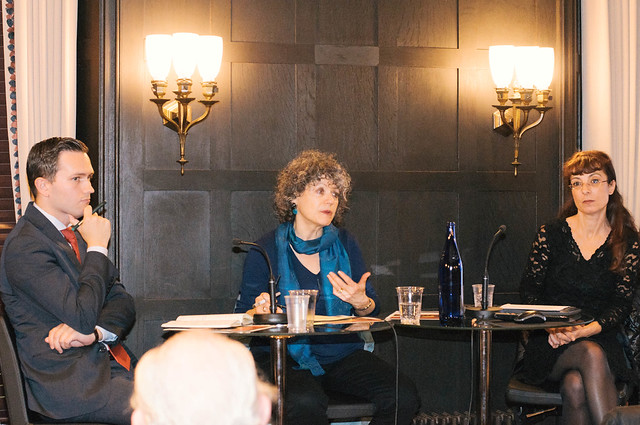Event Highlights: Frontiers of Fear with Ariane Chebel D’Appollonia and Thomas Volk
On November 2, the Center for the Study of Europe welcomed Ariane Chebel d’Appollonia and Thomas Volk for a panel discussion on the migrant crisis in Europe.
Ariane Chebel d’Appollonia is a Professor at the School of Public Affairs and Administration at Rutgers–State University of New Jersey. Her research focuses on politics of immigration and anti-discrimination, security issues, racism and xenophobia, extreme right wing movements, immigrant integration, urban racism and European policies.
Chebel d’Appollonia began her talk titled “The Refugee Crisis in the EU and its Implications” by calling attention to the complicated definition of refugee and its misconceptions. “[The word] refugee is not talking about migrants or immigrants,” she states. “There is no international definition of immigrant, but most working definitions applied are based on the voluntary decision to leave their countries. With ‘refugee,’ there is no choice; it is forced migration, people who had no other choice but to leave their countries.”
Chebel went on to express that the reasons for refugees’ departures are multitudinous—and contrary to popular belief, those reasons are rarely personal convenience or seeking asylum.
“Personal convenience is not the main motivation of the hundred thousand people currently trying to enter the EU territory,” Chebel states. There is also often confusion between refugees and asylum seekers. “A minority of these refugees aim to obtain the temporary status of asylum in another country,” says Chebel. She argues that the discrimination against refugees is truly a humanitarian crisis, and as numbers climb higher and higher passing 750,000 refugees in the EU territory, something must be done to protect their rights.
The securitization process of EU policies began in the 1980’s in order to secure the economic community, free movement of people, goods, and capital. This was a positive perception of the globalization, though with that change also came the distinction between internal and external borders and internal and external threat—thus the militarization of border control.
After 9/11, however, Chebel explains how perceptions of immigrants changed. “The European security strategy reinforced the idea that illegal immigrants are terrorists, or potential terrorists.”
Chebel proposes that in order to begin to solve the refugee crisis, Europe must create more paths for legal migration. “Why do we have so many refugees and so many illegal immigrants? It’s because we have no flexibility in Europe. We need a common visa policy, based on laborers’ skills. We don’t have that in Europe.” Even if Europe did have a common visa policy, however, Chebel claims that it still wouldn’t be “good enough.”
“This is not Europe in crisis only. We have to connect that [common policy] with the reform. I have no solution of how to end the crisis, the war in Syria, but if we don’t find a solution, we will have more refugees.”
Thomas Volk, a Ph.D. student at the Department of Islamic and Middle Eastern Studies at the University of Basel and Coordinator for Islam and Dialogue Between Religions at the Konrad Adenauer Foundation, presented a talk entitled “Islam and Muslim Life in Germany: Current Developments and Future Challenges.”
He explains how 70 to 80 percent of those entering Germany are of Muslim faith, and therefore, he claims, “they also transform the German society in a more profound way than maybe we all are aware of.”
Volk explains that, looking at the current situation of Muslims living in Germany, between 3.8 and 4.2 million Muslims live in Germany—roughly 5% of the German population. Forecasts predict that by 2030, this might be maximally around 7%.
“This is very important, especially if we take into consideration that we do have rising right wing movements in Germany that are playing with the fears of a potential Islamization of the German and of the European community.”
Because of the refugee crisis and the incoming refugees and asylum seekers, it is not outlandish to say that the number of Muslims living in Germany will climb to 7% earlier than 2030.
“This, of course, will bring up new topics we have to speak about in the German society,” explains Volk.
Volk stresses that there are different denominations of the Islamic faith. “If we look at the Muslims living in Germany so far, we see that 63% of them are Turkish-originated and are now the third generation of those immigrating to Germany during the 1960’s.”
“This is of importance if we take into consideration that, until 2005, Germany was not speaking of itself as an immigration country. It is only since 2005 that Germany accepted that yes, it is an immigration country. [Those who] came were not only guest workers, but also people with their own beliefs and their own cultures, and with their wish to settle down and have a better life.”
“The freedom of religion, the freedom of expression, the freedom of minorities are fundamental and important issues to work together to coexist within the European union,” explains Volk. “Therefore, I agree that this refugee crisis is not only a European crisis, but I would argue that it might lead to an upcoming conglomeration of several European crises soon.”
-Toria Rainey ‘18


